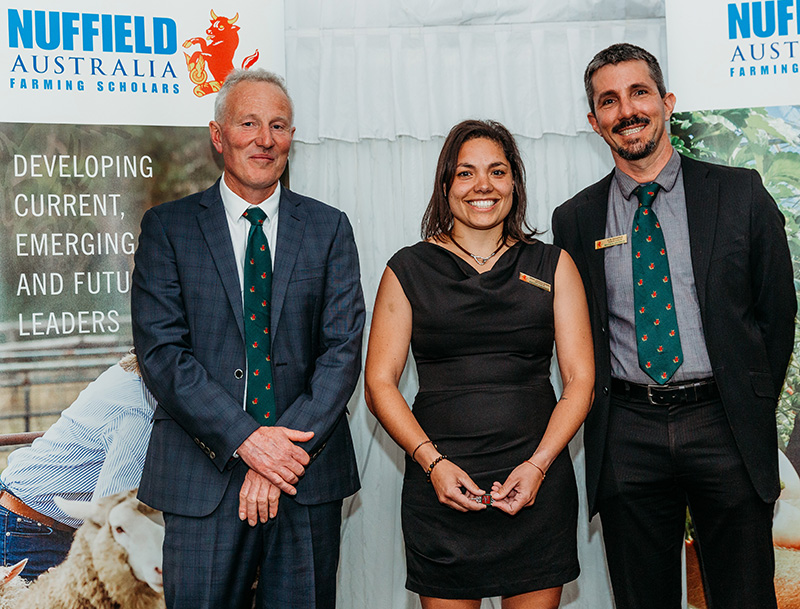Aquaculture has enormous potential to feed the world’s growing population and 2023 FRDC Nuffield scholar Joana Ferreira Mendes aims to help the sector do that sustainably and with the support of the community.

2023 FRDC Nuffield Scholar Joana Ferreira Mendes, with Nuffield Australia Chair Robert Bradley, and NT barramundi producer and 2016 scholar Daniel Richards.
Joana’s scholarship is supported by FRDC as part of its integrated leadership development program, which also includes support for the Australian Rural Leadership Program and the National Seafood Industry Leadership Program.
Joana is a compliance coordinator on a marine salmon aquaculture site in southern Tasmania, where she coordinates environmental issues and work health and safety.
Over the past seven years, she has worked with three aquaculture species - barramundi, prawns and salmon – giving her a wide perspective on seafood production.
“The industry is diverse with different operational systems although each primary producer has a common goal - to produce seafood sustainably," she says.
“Aquaculture is the fastest-growing food production sector in the world.
“The farming of Atlantic salmon in Tasmania represents one of the highest value and volume fishery products in Australia. Although the industry contributes significantly to the state’s economy, some communities and organisations have questioned the sustainability of salmon farming.
“In recent years, the growth and forecast for expansion of salmon farming have been criticised. I see an opportunity for the industry to breakthrough with sustainable ideas to improve the way we farm fish.
“I am also interested to explore the relationships between the industry and the community in other countries. The salmon industry is inevitably connected with the environment and its people, it’s important to strengthen this relationship to build a resilient future.”
As part of her scholarship, Joana will visit key aquaculture countries, Norway, Scotland, Canada and Chile, and bring back insights and innovations to help the Australian industry.
Joana hopes to provide Australian aquaculture with knowledge and background on how the different countries address sustainability, particularly in salmon farming. She plans to include detailed information on case studies and strategies that could work in Australia in her final report.
She says she hopes these insights will help the Australian sector to revise and improve current practices to align with Australia’s commitments to the United Nations Sustainable Development Goals.





